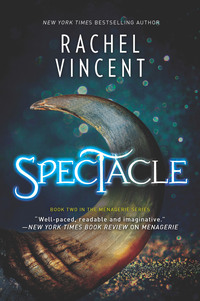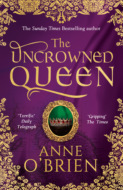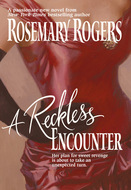Kitap dosya olarak indirilemez ancak uygulamamız üzerinden veya online olarak web sitemizden okunabilir.
Kitabı oku: «The Menagerie Series»
In this riveting sequel to New York Times bestselling author Rachel Vincent’s acclaimed novel Menagerie, Delilah Marlow will discover that there is no crueler cage than the confines of the human mind...
When their coup of Metzger’s Menagerie is discovered, Delilah and her fellow cryptids find their newly won freedom brutally stripped away as they are sold into The Savage Spectacle, a private collection of “exotic wildlife.” Specializing in ruthless cryptid cage matches, safari-style creature hunts and living party favors, the Spectacle’s owner, Willem Vandekamp, caters to the forbidden fetishes of the wealthy and powerful. At the Spectacle, any wish can be granted—for the right price.
But Vandekamp’s closely guarded client list isn’t the only secret being kept at the Spectacle. Beneath the beauty and brutality of life in the collection lie much darker truths, and no one is more determined than Delilah to strip the masks from the human monsters and drag all dark things into the light.
Praise for Menagerie
“Well-paced, readable and imaginative.”
—New York Times on Menagerie
“A dark tale of exploited and abused others, expertly told by Vincent.”
—Library Journal, starred review
“Vincent summons bold and vivid imagery with her writing.”
—Kirkus Reviews
“As depicted by Vincent, Delilah is magnificent in her defiance of injustice, and the well-wrought background for her world sets the stage for her future adventures in this captivating new fantasy series.”
—Publishers Weekly
“Vincent creates a fantastic world that is destined to pique your curiosity... As Delilah Marlow slowly uncovers a side of herself that she never knew existed, you’ll sympathize with her...desperate to see her succeed.”
—RT Book Reviews
“The promising opener in a new series...a fast-paced story of vengeance and justice.”
—The Roanoke Times
“Amazing world-building and a captivating cast of characters. My new favorite Rachel Vincent book.”
—#1 New York Times bestselling author Kelley Armstrong
Also by
New York Times bestselling author
Rachel Vincent and MIRA Books
The Menagerie Series
MENAGERIE
The Shifters
STRAY
ROGUE
PRIDE
PREY
SHIFT
ALPHA
Unbound
BLOOD BOUND
SHADOW BOUND
OATH BOUND
For more titles by Rachel Vincent, visit her website at rachelvincent.com.
Spectacle
Rachel Vincent

This is for everyone who followed me down the dark and twisted tunnel that is Menagerie.
Welcome back.
Contents
Cover
Back Cover Text
Praise
Booklist
Title Page
Dedication
Part One: Démasqué
Prologue
First Quote
Chapter 1
Chapter 2
Chapter 3
Second Quote
Chapter 4
Chapter 5
Chapter 6
Chapter 7
Chapter 8
Chapter 9
Third Quote
Chapter 10
Chapter 11
Chapter 12
Chapter 13
Chapter 14
Chapter 15
Fourth Quote
Chapter 16
Chapter 17
Chapter 18
Chapter 19
Part Two: Menagerie
Chapter 20
Fifth Quote
Chapter 21
Chapter 22
Sixth Quote
Chapter 23
Chapter 24
Seventh Quote
Chapter 25
Chapter 26
Chapter 27
Chapter 28
Chapter 29
Eighth Quote
Chapter 30
Chapter 31
Chapter 32
Ninth Quote
Chapter 33
Tenth Quote
Chapter 34
Chapter 35
Chapter 36
Chapter 37
Chapter 38
Chapter 39
Acknowledgments
Extract
Copyright
Part One
Démasqué
Twenty-seven years ago
A scream broke through the surface of Tabitha’s dreams like an oar slicing through calm water, and she sat straight up in bed, still half-submerged in that other world. Heart pounding, she slid one small hand beneath her mattress, grasping for the handle of the knife her mother had hidden there.
Just in case.
Because if there were another reaping, parents could not be trusted. Children would have to protect themselves.
Tabitha’s fingers found the blade of the knife instead, and the cut was a sharp, immediate pain. The clarity of the sting—not muddled like blunt blows that left bruises—drew her thoughts into focus and vanquished the fog of sleep. She sucked on the cut without truly noticing the familiar, coppery taste of blood. Then she slid off the bed and lifted her thin mattress, bedding and all, and seized the knife the proper way.
Just like her mother had shown her.
Another scream sliced through the night, startling crickets and cicadas into silence, and Tabitha whirled toward the source of the sound. The open window over her nightstand.
She pushed the sheer curtain aside and bent to stare through the gap beneath the old, cloudy glass and the flaking windowsill.
Candlelight flickered in the barn.
Tabitha straightened her pale green nightgown, covering an old bruise on her leg, then headed for the hall clutching the knife. No one knew what a second reaping would look like, but Tabitha knew where to stab. Her mother had shown her which soft bits of flesh would be most vulnerable to her blade, should he come into her room at night, and Tabitha remembered every lesson.
What she did not remember was that the first lesson had come three years ago, almost a year before the reaping.
In the hall, Tabitha passed the bathroom and peeked into Isabelle’s room on her way toward the stairs. Isabelle’s bed was empty. Her sheet was thrown back and her slippers were missing.
Tabitha took the stairs one at a time, flinching with every creak of the wooden treads. Downstairs, her parents’ bedroom door stood open. Their bed was empty too.
Barefoot, her stomach pitching with fear and dread, Tabitha pushed open the back door and descended three porch steps. The grass felt prickly against her bare feet, but the backyard was peppered with smooth patches of soft dirt. When she was halfway across the yard, another scream froze her in place. Her fist clenched around the knife handle.
But then she exhaled slowly and pushed forward. That wasn’t her mother’s scream. It was just Isabelle’s.
Over the past two years, she had heard Isabelle cry a lot from her room down the hall. She’d heard Isabelle pray and beg in the middle of the night. But the screaming was new. Was that why Tabitha’s mother slept with earplugs? Had she known there would eventually be screaming?
Tabitha pushed open the barn door. The horses looked nervous, shuffling in their stalls and tossing their manes. Her father stood in the center aisle, clutching a thick-bottomed glass. In the light flickering from a candle stuck to the top of the nearest stall with melted wax, she could see that the glass was empty, but for a single melting ice cube.
The front stall was supposed to be empty too.
“Tabitha?” Her father’s gaze struggled to focus as he stared at her, and she knew that was not his first glass of the night.
At the mention of her daughter’s name, Tabitha’s mother popped up from the nearest stall like Jack from his box. Her clear gaze was focused and hard. “Go back to bed. We’ll talk in the morning.”
“Let her stay,” Tabitha’s father said. “Nine is old enough to know how the world works.”
Neither of them mentioned the knife their daughter held.
Tabitha’s mother frowned, then sank onto her knees in the stall again. Her father waved her forward, and when she hesitated two feet away, he slapped one rough hand onto her shoulder and pulled her closer, positioning her in front of the open stall.
Tabitha flinched, but she forgot all about the unwanted hand when her gaze landed on the floor of the stall. There, propped up on both elbows in the strewn hay, lay Isabelle. Her face was crimson and streaked with tears. Her hair was sweaty and matted, odd strands of it clinging to her damp cheeks.
“Tabitha,” Isabelle panted. “Help me.”
But there was nothing Tabitha could do but watch.
Most of Isabelle’s hair was dark, from the dye Tabitha’s mother made her use, but the roots were a soft green. The very shade of the moss that grew along the edges of the stream running through the back acre of her father’s farm. The acre that used to belong to Isabelle’s family.
Isabelle had been fourteen when the soldiers had come for her parents after the reaping, when all the cryptids were being rounded up. Everyone knew it was coming. Isabelle’s parents had begged Tabitha’s mother to hide their daughter. To save her. But it was Tabitha’s father who’d agreed. He was the one who’d thought of the dye—the same shade his wife used to cover her gray. The same shade of Tabitha’s hair.
Tabitha and Isabelle could be like sisters, he’d said. And because he’d always been fond of his neighbors’ daughter, he’d agreed not only to hide Isabelle, but to buy his neighbors’ land after the state foreclosed on it and save it for her. For when she grew up.
Isabelle grew up real pretty. Tabitha’s father always said that. But she’d had to quit school when she got fat. Tabitha’s mother said people wouldn’t understand. They’d figure out she wasn’t human and they’d come for her too. So Tabitha kept the secret about pretty Isabelle, who cleaned the house and cried at night.
Nine years old was old enough to keep a secret, her father’d said.
But now, on the floor in the barn, Isabelle didn’t look so pretty. And suddenly Tabitha understood.
“Is she having a baby?” That’s what their mare had done when she’d lain down in the barn.
“It might be a baby.” Tabitha’s mother peered down at Isabelle, blocking Tabitha’s view. “But it might be a monster. We’ll know in a few minutes. It’s time to push.”
Tabitha’s father’s grip tightened on her shoulder. His other hand clutched his empty glass.
Tabitha watched, fascinated, as Isabelle gave birth, too tired now to scream. When it was over, the baby gave a hearty cry, and Tabitha’s father sucked in a breath. Tabitha’s mother pulled a rag from the pocket of her apron and wiped the infant’s face. She stood and turned, holding the child closer to the candlelight to examine it.
“Please...” Isabelle begged from the ground. “Let me see him.”
“Her,” Tabitha’s mother corrected. She folded the rag, then scrubbed it gently over the infant’s head. Then she looked up at her husband, disappointment clenching her square jaw.
The baby’s hair was a soft, pale green.
Tabitha’s father threw his glass at the side of the barn. It shattered, raining shards all over the hay. She flinched. Her father stomped out of the barn, headed for the house.
Tabitha’s mother spread the rag on the ground at Isabelle’s feet, then laid the baby on top of it. She turned to her daughter as Isabelle cried.
“Give me your knife.”
“While families all over the country are in mourning, a couple of local grandparents are counting their blessings. Two weeks ago, twelve-year-old Willem Henry Vandekamp survived what’s become known as The Reaping because he was at a birthday party sleepover. He is Otto and Judith Vandekamp’s only surviving grandchild.”
—from a September 4, 1986, broadcast of the Channel 10 Nightly News, Poplar Bluff, Missouri
Rommily
The oracle wandered down the midway, her gaze flitting from one brightly striped tent to the next, her fingers reaching for each soft scrap of silk and scratchy patch of sequins she passed.
She had not forgotten the cages and chains and blood. No matter how fractured her mind might be, she could never erase the pain and terror of that night in the rain or overcome a lifetime spent in a four-by-six animal pen.
But those were distant horrors now, relegated to the realm of nightmares.
The daylight was for dreaming.
As she meandered in the afternoon sun, her eyes were bright and focused. Her thoughts—typically tangled like a knotted cord—were blissfully calm, because there were no customers yet, and her fellow carnies knew better than to touch or speak to her. Those she considered friends smiled or waved when she passed, and those she cared little for paid her little attention.
Rommily listened to the shifters count out beats under the big top as they rehearsed an addition to their hoop-jumping, ball-balancing act. She heard the soft shuffle of hooves from behind a heavy canvas flap as the centaurs played their afternoon game of poker with Abraxas, the young human roustabout who’d taught them when to hit and when to stand.
As she passed the next tent, Rommily heard a familiar snort, and the sound triggered a warmth that spread beneath the surface of her skin. She veered from the midway with no conscious intent. Her feet followed instructions from her heart without consulting her brain, and a minute later, she stood behind the equine tent, where a single broad tree spread limbs in all directions, and with them, cool patches of shadow.
The minotaur sat in the shade on a wide, sturdy bench most men couldn’t have lifted. He stood when he saw Rommily, and the images that flashed behind her eyes were triggered not by premonition but by memory.
Strong hands tearing guilty flesh.
Blood spilled in the name of justice.
She said nothing as she crossed the patch of sparse grass separating them. Rommily only spoke in the grip of a vision, since that night in the rain, and without a human mouth, the bull couldn’t speak at all. Their connection had developed without the luxury of unnecessary words.
The minotaur’s arms spread as Rommily came closer. She reached out for him, her hand tiny and fragile against massive planes of muscle, her touch a delicate contrast to his raw power. The oracle trailed her fingers over the ridge of his human collarbone, just where dense, soft bovine fur began to grow. The top of her head didn’t reach his shoulder, and three of her standing side by side couldn’t have matched his width, yet she seemed to fit perfectly when she laid her head against his chest and wrapped her arms as far as they would go around his immense rib cage.
For several long minutes they stayed just like that, free from the burden of words. Safe from prying gazes.
When the pace of the day began to pick up—when footsteps fell hurriedly and voices began to sound tense—she reluctantly stepped back and squeezed the bull’s hand, then made her way to the fortune-telling tent all on her own.
Her older sister, Mirela, was already dressed in the white flouncy blouse and long, colorful skirt of a fortune-teller—an oracle cursed by fate with the genes of a “cryptid” and cursed by law with the chains of captivity.
Once, the outfit and chains had been authentic. Their internment in the traveling menagerie had been reality. Now the clothes were a costume—the wool pulled over the eyes of an audience that wanted to believe what it was seeing.
Metzger’s Menagerie—the institution that had once held her in bondage, half-starved and sometimes beaten where the bruises wouldn’t show—had become her salvation. It was now the veil shielding her from the prying eyes and cruel hands the rest of the world seemed so eager to wield.
Lala, Rommily’s younger sister, wore blue jeans and a red uniform shirt, which declared her name to be Louise. That was a lie Rommily found funny on some days and sad on others, but today she gave it little thought as she stepped behind the folding screen and exchanged her long white cotton dress for a blouse and skirt matching Mirela’s. She wasn’t fit to perform—not even the miracle of freedom could fix her shattered mind—but she had to wear the costume because the inability to control her visions meant she couldn’t pass for a human employee.
Dressed, she let Lala secure her with chains and shackles that didn’t really lock. Then when Mirela slid her paperback novel beneath the table and gave them a nod, Lala led Rommily out the tent onto the midway, where she would serve as a living advertisement for the wonder customers would find inside.
Overhead, static blared from a speaker mounted on a tall pole, then organ music poured forth, its playful notes dancing up and down the oracle’s spine, spinning around and around in her head like the stylized mermaid and unicorn seats on the carousel. The music was calming, some nights, because it signified a routine she knew well. But tonight the notes made her dizzy.
The oracle’s gaze lost focus. Her eyes closed as she chased the melody in her head, winding down mischievous paths and around dark corners. She didn’t notice when the carnival gates opened or the crowd appeared. She didn’t notice when Lala launched into her spiel.
The music felt odd tonight.
Laughter broke into the oracle’s thoughts and her eyes flew open as a father passed by the fortune-teller’s tent, tickling a toddler whose hair was fixed in blond pigtails.
“Cradle and all...” Rommily mumbled, her gaze glued to the child as terrifying images flickered deep in her mind. The crowd seemed to blur as her focus skipped from face to face, searching for another piece of a puzzle she would never be able to fully assemble.
Minutes later, a man and woman pushed a stroller down the midway. Rommily stared into it as it passed, and her eyes glazed into solid white orbs. “Out with the bathwater!” People turned toward the oracle and her petite female handler, intrigued by what they assumed to be part of the show. “Wednesday’s child! From the cradle to the grave!”
Parents pulled their children closer. The crowd began to murmur, and the whispered word reaping met Rommily’s ears.
Lala’s sales pitch ended in midsentence as she tried to shush her sister. But Rommily’s message—unclear as it was—could not go unheard.
“The hand that rocks the cradle rules the world!”
Delilah
Calliope music shrieked from the speakers just off the midway, its grating notes bouncing around my head like the ricochet of a whimsical bullet. Night after night, the iconic circus music managed to overwhelm all the other sounds of the menagerie, no matter how loud the cries of the barkers and buzz of the crowd grew.
Not that there was much of a crowd on the midway, after 10:00 p.m. The main event drew most of the customers into the big top for the last two hours of every evening, leaving only stragglers to knock down mermaid-shaped cutouts with water guns and toss rings onto an inflatable minotaur’s plastic horns. Or to visit the exhibits.
“Delilah!”
I turned toward the sound of my name to find Lala at her post in front of the fortune-teller’s tent. Folding my arms over my clipboard, I crossed the sawdust-strewn path toward her, sidestepping a little boy eating a melting ice-cream cone while his father threw darts at the balloon breasts of a cartoon-style siren. My head throbbed from the music and my feet ached from another eighteen-hour workday, but I put on a smile for Lala.
She was living her dream.
“How’d we do?” the youngest of the three oracles asked, crossing her arms over a red Metzger’s Menagerie polo. She’d filled out a bit with proper nutrition, since our coup of the menagerie, but the true source of her newfound confidence was the hours she spent watching television and listening to the radio while she worked, immersing herself in human culture. Despite her youth—she was barely nineteen—Lala had become one of our most self-assured and dependable liaisons with human society, and it certainly didn’t hurt that she looked completely human when she wasn’t in the grip of a vision.
“Um...” I checked the figure at the bottom of the form clipped to my clipboard. “Fifty-one thousand, two hundred seventy-two dollars.” Gross. In one night.
“That’s almost a thousand dollars more than last night.” Lala’s brown eyes shone in the light from a nearby pole. “That’s good, right?”
“It’s very good.” That was nearly twice what I’d made in a year as a bank teller, before I was “exposed” and sold into the menagerie. I should have been thrilled, especially considering that at $104 per ticket, admission wasn’t exactly affordable for the nine-to-fivers and minimum wagers who made up most of our customer base. Yet people kept paying night after night, in town after tiny, rural town.
“We’ll be near Tucson in a couple of days, right? I know we have bills and things, but do we have enough?” Her wide-eyed optimism made me feel guilty for being the bearer of bad news.
“Lala, we don’t have any. The money’s spent before we even make it.”
“What? All of it?” Unshed tears seem to magnify her eyes. “But we’re going to be within a few miles of Gael’s son.”
Like most of us, Lala got invested in every cryptid we tried to buy from the other menageries, preserves and labs that owned them. But this one was personal for her. She was the one who’d found the berserker’s son, in a vision.
“We have to buy him, Delilah. That’s the whole point of this, right?” She spread her arms to take in the entire menagerie, and our perilous, secret possession of it. “So pay something late. We only need twelve thousand dollars.”
Right after we’d taken over the menagerie, I would have paid it in a heartbeat to free one of our fellow cryptids from captivity. In fact, I’d done just that, before I had a handle on the menagerie’s finances. Before I’d realized how dire our financial situation really was.
I’d handled tens of thousands of dollars in cash nearly every night since we took over the menagerie, but the vast majority of it went to paying our operating costs. Taxes. Licenses and permits in every single town. Fairground rental fees. Inspections. Food. Fuel. Maintenance. And insurance. That was the big one. Insurance alone cost Metzger’s Menagerie more than a million a year. And we were only getting off that easily because Rudolph Metzger hadn’t reported most of our recent “incidents” to the insurance company—some, because the old man was trying to cut corners, and some because he was no longer in a position of authority at the menagerie.
We’d shipped him south of the border in one of his own menagerie cages, as a peace offering to the marid sultan, whose only daughter had died during our revolt.
If the insurance company knew about everything Metzger had covered up, our coup of the menagerie would have been exposed long ago, not because a customer saw through our masquerade, but because of simple, stupid bankruptcy.
Even so, we sat on the verge of that very catastrophe on a nightly basis.
“Lala, we’re already paying bills late. If that gets any worse, they’ll start foreclosing on things.” Old man Metzger had bought much of his equipment on credit. Ironically, we no longer needed most of it, since we were running our own show now and only selling the illusion of captivity. But we couldn’t return any of it without explaining why our creatures and hybrids no longer needed to be restrained or sedated.
“There has to be a way,” the young oracle insisted, heartbreak shining in her eyes.
“Maybe there is. I don’t want everyone to get their hopes up, but I was thinking about asking Renata if she’d be willing to help.”
“Oh!” Lala jumped and clenched her fists in excitement.
“Shhh!” I stepped in front of her, trying to shield her delight from the man running the funnel cake stand. The game booths and food stands—everything other than the actual menagerie—belonged to subcontractors who worked the seasonal carnival route. They had no idea Metzger’s was being run by the very cryptids who made up its exhibits and performances, and if any of them ever found out, our ruse—and our freedom—would come to a violent end.
“Sorry,” Lala whispered, as she recomposed herself into the role of tired carnival worker. “I just... I thought it was too dangerous to let the encantados play with people’s minds.”
“It is. But we don’t have a lot of choice this time.” I pulled my pen from the top of the clipboard while she tried to control her smile. “I have to go collect the stats. What was your head count?”
“Two hundred seven. We had a thirty-minute-long line late this afternoon.”
“Mirela must be exhausted.” The oldest of the three oracles was alone inside the tent, since it was Lala’s turn to play carnival employee.
Lala shrugged. “Exhaustion makes the bed feel that much softer at the end of the night.”
I gave her a smile as I moved on to the next tent. Her upbeat outlook never failed to amaze me. At the end of the day, as grateful as I was to have regained my freedom, I couldn’t help missing the apartment and belongings I lost when I was arrested and sold. I resented the fact that even in freedom, I had to hide. But Lala lived for every minor liberty and moment of comfort, as if indulging in them might someday make up for everything she’d been denied in her sixteen years as a captive.
I continued down the sawdust path, taking head counts from the few tents that were still open until I got to the bestiary, where the nonhuman hybrids were on display in a series of vintage circus cage wagons. Ember, the phoenix, was easily my favorite. From her head down, her plumage graduated through shades of red, yellow and orange, ending in long, wide tail feathers that looked like living flames in the bright light thrown from high pole-mounted fixtures. But she could hardly even stretch those tail feathers in the confines of her cage.
Darkness shifted behind the next enclosure, a subtle blending of one shadow into another, and though I heard neither footsteps nor breathing, I knew I was no longer alone.
“This isn’t fair to them.” I tucked my clipboard under one arm and stared up at the phoenix.
“I know.” Gallagher stepped out of the shadows, yet they seemed to cling to him, giving him a dangerous look that most humans would feel, yet be unable to truly understand. They would blame their instinctive fear on his towering height. On his massive musculature. But they wouldn’t really grasp his destructive potential.
If they were lucky.
“I got a quote on bigger cages, but considering that our budget is around zero, it’s not going to happen anytime soon.” Three months after our coup, we had yet to come up with a solution for the beasts’ confinement. Their enclosures were inhumanely small, but much like the lions in any zoo, the chimera, the griffin and the others were all far too dangerous to simply keep on leashes. “We’re going to have to raise ticket prices.”
Gallagher shook his head, and light shone on the red baseball cap covering most of his short, dark hair. “The menagerie’s customer base is blue-collar. They’re already paying more than they can afford. We need to be touring larger venues. Exhibition grounds. Amusement parks.”
“No.” I was already weary of the argument we’d been putting off for two months. “Bigger venues are too much of a risk.”
“Eryx brings in five hundred people in every tiny town we visit. Imagine the thousands he’d attract in a larger venue. In bigger cities.”
I turned to look up at him. “The cryptids... We’re all still skittish, Gallagher. Most of them are terrified to deal with vendors and carny subcontractors, and with good reason. That would only be worse if we played larger venues, with more inspections and more invasive oversight.”
His brows furrowed low over dark eyes. “It’s September, Delilah. Schools are already back in session, and the county fair circuit will dry up in the next few weeks. If we’re not prepared to step into the big interior venues—stadiums and concert halls—we won’t make it through the winter, because we certainly can’t raise funds the way old man Metzger did.”
The very thought gave me chills.
During the off-season, when the carnival circuit shrank to virtually nothing, Rudolph Metzger had rented the most exotic of his cryptids to various private collections, where they were exhibited in a more formal setting for high-dollar clientele who wouldn’t frequent a sweaty, dirty, outdoor carnival.
“We’re not renting anyone out, and we’re not risking larger venues.”
In our menagerie, we ran the shows and set our own limits. Except for the required inspections, there was no third-party oversight. Under Gallagher’s plan, one suspicious stadium employee could blow our ruse wide-open, and we’d all be back in cages. We couldn’t take that risk.
“We’ll find another way,” I assured him.
Our plan had been to take the entire menagerie south of the border. But when Sultan Bruhier’s daughter, Adira, died during the coup, he’d closed his borders, leaving us trapped in the United States, where exposure would mean imprisonment, and in many cases, torture.
“We could send Bruhier another gift,” Gallagher said. I shook my head, but he kept talking. “I could call one of the old handlers and offer him a job, then throw him in a cage and ship him down to the sultan.”
“We gave him Metzger. If gifting him the owner didn’t work, sending a mere menagerie employee won’t either. And even if I were okay with sending someone else to be tortured to death at the hands of the sultan, it took forever for the encantados to make the old man’s family think he ran off with an acrobat. We can’t make another person disappear.”








